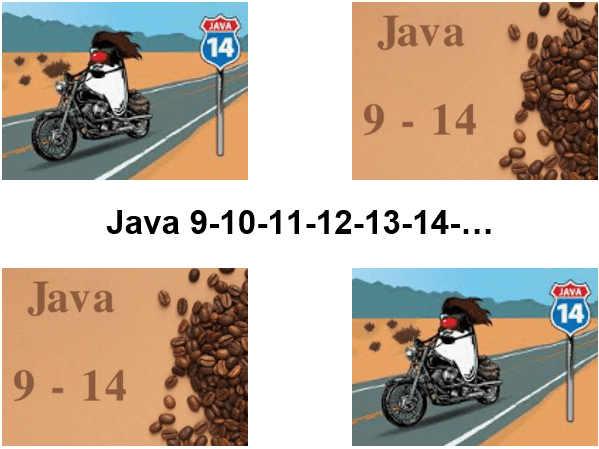-
Learning by doing
-
Trainers with practical experience
-
Classroom training
-
Detailed course material
-
Clear content description
-
Tailormade content possible
-
Training that proceeds
-
Small groups
In the Java 9-10-11-12-13-14 -... course participants learn the new features that have been added to the Java Platform after Java 8. Since Java 9 a new release of Java is published every six months, so that the Java versions have succeeded each other in rapid succession ever since. This is much faster than the 3-year time span that was previously common.
The new release frequency fits better in the modern continuous delivery world. You don't have to wait long before new features are implemented in Java. The consequence is that new Java versions contain fewer new features and that it is also not clear in advance which feature has been introduced in which version. Also organizations will not be able to implement a new upgrade of their code base every six months.
The course starts with the discussion of the new features in Java 9. Among other things the new module system introduced in Java 9 is discussed. Modules can be seen as a kind of package over Java Packages, so that code can be built in an even better modular way and is reusable.
Attention is paid to the additions in Java 10, such as type inference, class data sharing and more. Attention is also paid to improvements in GC algorithms and the JVM.
Next we pay attention to the extensions in Java 11 such as nested access control, lambda parameters, new String class methods and more. Java 12 additions include switch expressions, raw String literals, the JVM Constants API and more. These extensions are also discussed and explained.
Finally the new features of the Java 13 and 14 releases are treated as well as the features of releases that have been published since then. The course is constantly updated and focuses on the most important new features since Java 8.
The course Java 9-10-11-12-13-14-... is intended for developers who want to learn the new features that were added to Java since version 9.
Good knowledge of and experience with Java 8 programming is recommended, but is is not required to have extensive knowledge of Java 8.
The theory is treated on the basis of presentations and is interchanged with exercises. Demos are used to clarify the theory. The course uses the newest version of Java. The course material is in English. The course times are from 9.30 up and to 16.30.
Participants receive an official certificate Java-9-10-11-12-13-14-.... after successful completion of the course.

Module 1 : Java 9 |
Module 2 : Java 10 |
Module 3 : Java 11 |
|
Module System JShell CompletableFuture API Reactive Streams HTTP 2 Client Diamond Operator Private Interface Methods Factory Methods Optional Class Process API |
Type Inference Long Term Support Class Data Sharing Release Versioning Root Certificates Thread-Local Handshakes GC Interface Parallel Full GC Tag Extensions JDK Forest |
Nested Access Control Epsilon Dynamic Class-File Constants Flight Recorder Lambda Parameters Cryptographic Algorithms New String Methods Aarch64 Intrinsics Low Latency GC Java Single Command |
Module 4 : Java 12 |
Module 5 : Java 13 |
Module 6 : Java 14 ... |
|
Switch Expressions File mismatch() Method Compact Number Formatting Teeing Collectors JVM Constants API Raw String Literals instanceof Pattern Matching Abortable Mixed Collections Default CDS Archives |
Text Blocks Socket Reimplementation newFileSystem() Method DOM Namespace Support SAX Namespace Support Uncommit Unused Memory Dynamic CDS Archives Unicode 12.1 Support yield Statement |
Packaging Tool JFR Event Streaming Foreign-Memory Access API Mapped Byte Buffers Helpful NullPointerExceptions Records NUMA-Aware Allocation Removed Features Beyond Java 14 |
